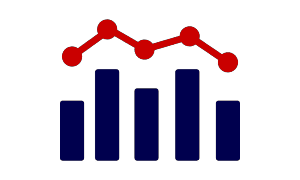How Do Betting Odds Work? – Turning Knowledge Into Profit!
Learning how betting odds work is one of the first steps to take for any sports bettor. Although it can be a little complicated, with some practice, reading betting odds can easily become second nature. Understanding betting odds is extremely important as it can help players determine payouts, bet sizes, and how to take advantage of a betting line.
In this guide, we will be looking at what betting odds are, how it works, and how to turn that knowledge into profit!
What are Betting Odds?
Odds refer to the likelihood of a specific outcome. In gambling, odds refer to the ratio of winnings to the bet (stake) and players also get their wager returned. Its use facilitates betting on sporting events where the likelihood of different outcomes vary.
Types of Betting Odds
Although all these types of odds will ultimately have the same meaning, they present the odds in alternate ways. This means the chances of an event occurring can be presented in any of the three ways below:
British – Fractional Odds
These are popular especially among Irish and British sportsbooks. They are typically presented with a slash (/) or hyphen (-). For example, odds of 4/1 or 4 to 1 is where you win 4 units for every 1 unit you bet on. Similarly, 7 to 2 odds means you win 7 units for every 2 units you bet.
European – Decimal Odds
Decimal odds are also known as continental odds, digital odds, or European odds. Popular in Europe, New Zealand, Australia, and Canada, it can be easier to understand as it allows players to easily spot favorites and underdogs.
For example, when betting on a match, you get odds of 3.00 for team A and odds of 1.5 for team B. In this case, you win 3 units for every 1 unit you bet if Team A wins. Meanwhile, you only win 1.5 units for every 1 unit you bet if Team B wins. Here, you can see that Team A is the underdog while Team B is the favorite.
American – Money Line Odds
Money line odds, American odds, or U.S. odds are naturally popular in the United States. The underdogs are indicated by the plus (+) sign or positive number while the minus (-) sign or negative number odds accompanies the favorites. The number next to these signs show the amount you will win for every 100 units staked.
For example, in a game where Team A has +200 odds while Team B has odds of -350. This means that Team A is the underdog where you win $200 by betting $100 if they win the match. Meanwhile, Team B with the negative odds of -350 denotes them as the favorite and a bet of $350 would only win you $100.
In cases where players find it difficult to understand American odds, here are some ways to convert it to decimal odds:
| Positive American Odds to Decimal Odds | Formula: (Positive Odds / 100) + 1 For example: +220 odds 220 / 100 = 2.2 + 1 = 3.2 |
| Negative American Odds to Decimal Odds | Formula: (100 / Negative Odds) + 1 For example: -380 100/380 = 0.26 + 1 = 1.26 |
Using Betting Odds to Calculate Probability
Betting odds are a great way to calculate the probability or likelihood of an outcome. For example, if the odds of Team A winning are 4/1, the probability would be 1/ (4 + 1) = 0.20. This means there is a 20% chance that Team A will win. Here are some other examples:
- Odds of 1/1: 1/ (1 + 1) = 0.50 = This means the likelihood is 50%.
- Odds of 8/1: 1/ (8 + 1) = 0.11 = This means the likelihood is 11%.
Using Betting Odds to Calculate Potential Winnings
Betting odds can also show you the payout to expect if you win the bet. Here, we can use the same examples above to show you how to calculate your potential profit if you win:
- Odds of 4/1: For every 1 unit you bet, you win 4 units. This means your total payout will be 5 units (including the return of your wager).
- Odds of 1/1: For every 1 unit wagered, you win 1 unit. This means your total payout will be 2 units (including the return of your stake).
- Odds of 8/1: For every 1 unit staked, you win 8 units. This means your total payout is 9 units (including the return of your bet).
What are Good Odds?
Choosing a sportsbook with good odds can be difficult. Good odds ultimately depend on the online betting market and are the best value for players. When comparing bookmakers, a good opportunity would be seeing bookmakers offering short odds on a certain market while a different bookie offering much higher odds. Needless to say, players should go with the site offering higher odds.
Who Sets Betting Odds?
Betting odds and lines are offered to players or bettors by sportsbooks or betting sites such as BetMGM or DraftKings. The odds can also come from third-party firms. In these cases, the sportsbooks typically have identical lines for many markets. In these sportsbooks, there is generally a head oddsmaker who sets the odds for various events and matches.
What factors influence betting odds?
These odds are based on calculations from computer algorithms, insider tips, power rankings, and more. Here are some factors that influence betting odds:

Betting Trends
Bookmakers are out to make money. To do this, they make odds where they are less likely to lose out on profit. This means that the sportsbook will continuously analyze the participants or teams players bet on. If a large amount of money is wagered on a specific bet, the bookmakers automatically lower the odds so as not to lose money.

Statistics
Numbers matter in betting. This is why oddsmakers take into consideration historical statistics of the team involved. If a team has been statistically successful, this is reflected in the odds created.

Competitors
Since there are many bookies out there, they look at the odds offered by their competitors to stay ahead of the competition while reading trends. If a different bookmaker lowers he odds on a specific bet, chances are others will as well to “play it safe” rather than risk losing out on profit.
Do Odds Differ Depending on the Sport?
Odds may be presented differently based on the sport. However, the differences are slight. Understanding the basics of how odds work easily helps you understand odds for any sport. Here are some examples:
Odds in American Football or Basketball
When betting on basketball (NBA) or American Football (NFL), you may come across the following:
| Team | Point Spread | Moneyline Odds | Total |
|---|---|---|---|
| A | +4 (-110) | +200 | Over 42.5 (-110) |
| B | -4 (-110) | -170 | Under 42.5 (-110) |
In this instance, Team A is the underdog. As the point spread indicates, it will be getting an additional 4 points to their final score while Team B is the favorite and will have 4 points deducted from their final score.
The moneyline then indicates that betting 100 on Team A will allow you to win 200 while betting the same amount on Team B only wins you 170. The over/under 42.5 then means that you are betting on either team gaining more or less than 42.5 points. However, you will need to bet 110 to win 100.
Odds in Baseball
Baseball is a sport where the odds are similar but slightly different. This showcases how different sport can have minor differences when it comes to betting odds. While the moneyline odds and over / under in baseball is the same as American football or basketball, the point spread or line varies. For example:
| Team | Run Line | Moneyline Odds | Total |
|---|---|---|---|
| A | +1.5 (-155) | +135 | Over 8 (-110) |
| B | -1.5 (+135) | -155 | Under 8 (-110) |
Similar to the example seen in American football or basketball, the moneyline here shows that you will profit 135 by betting 100 on Team A. Meanwhile, you will profit 100 by betting 155 on Team B. For the total, bettors can wager if there will be over or under eight runs from both teams. The number -110 here means that you will profit 100 by betting 110 on either bet.
For the run line, you can bet that the favorite Team A will win by 2 or more runs. The other option would be that the underdog Team B wins or lose by one round or less.
Can Betting Odds Change?
Yes, betting odds can change especially when a large sum of money is wagered on one side of the bet. Sportsbooks generally take a 10% cut of the amount wagered and this amount is maximized when the bets are as 50-50 as possible. When 80% of the bettors have a high chance of winning, the sportsbook loses out.

Conclusion
Understanding how betting odds work is an important skill for any punter as it helps them to identify good odds to make the most out of their bankroll. If you are planning to enter the betting world, be sure to familiarize yourself with the conversions of different formats, implied probabilities, and the calculation of the payout. Only then will you be able to place a well-educated bet.
FAQs
How do you work out betting odds?
Bookmakers and sportsbooks create sports betting odds to show the likely outcome of a game or event. These odds also denotes how much the payout is if the player wins the bet. For example, a bet where the odds are 4 to 1 can be written as 4/1 or 4:1 means that the player who wins the bet gets 4 times the amount staked.
How do bookmakers calculate betting odds?
Bookmakers calculate betting odds based on a variety of factors including insider tips, computer algorithms, power rankings, the amount wagered for each side, and more.
What are the odds of a coin toss?
A coin has two sides. This means that in a coin toss, it will either end up on side A or side B. Since there are only 2 outcomes, the odds are 50/50.
What does it mean if the odds are -150?
In odds of -150, it shows that it is in the American odds or moneyline bet. As explained above, the negative sign or minus sign shows that the team is the favorite to win. Meanwhile the 150 means that you would have to bet $150 to win $100.
Why should I understand betting odds?
Learning how to read betting odds allows players to choose the best odds from various bookmakers. Since these sportsbooks come from different regions, knowing more about how the different formats work can be a great advantage.
Why do I have to risk more when betting on the favorite versus the underdog?
Since the likelihood of the favorite winning is much higher versus the underdog, the amount you win is much lower while the stakes are higher. This gap in odds is referred to as vigorish (vig) or juice, meaning the tax the sportsbook charges.


